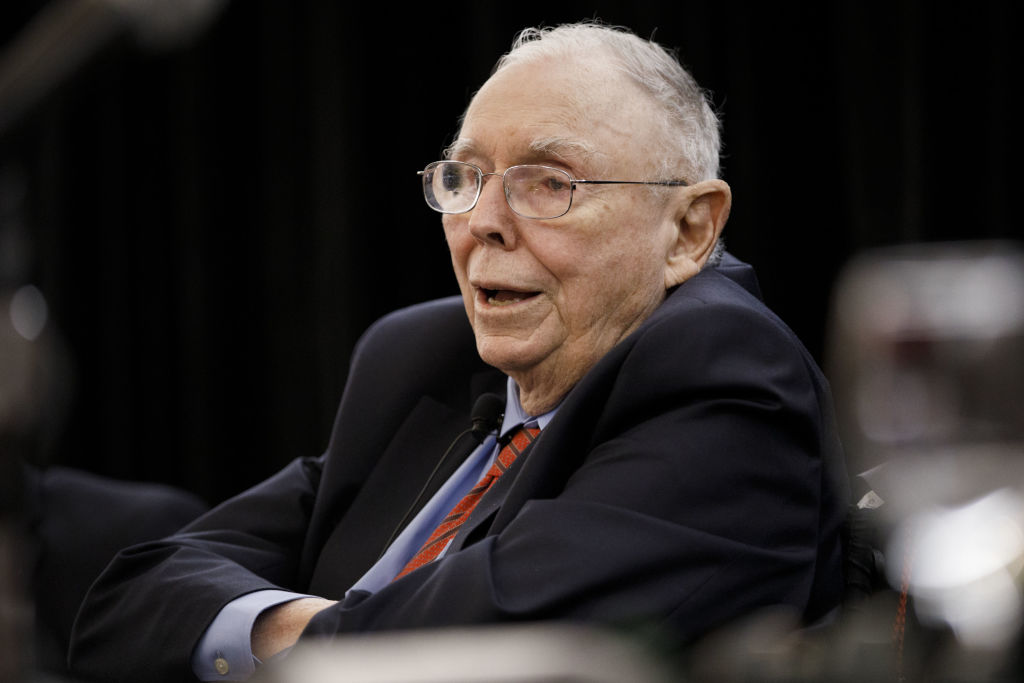MoneyWeek's people of 2023
What do Taylor Swift, Sam Altman, Charlie Munger and Sam Bankman-Fried have in common? They're all people who moved markets over the past year.

Get the latest financial news, insights and expert analysis from our award-winning MoneyWeek team, to help you understand what really matters when it comes to your finances.
You are now subscribed
Your newsletter sign-up was successful
Want to add more newsletters?

Twice daily
MoneyWeek
Get the latest financial news, insights and expert analysis from our award-winning MoneyWeek team, to help you understand what really matters when it comes to your finances.

Four times a week
Look After My Bills
Sign up to our free money-saving newsletter, filled with the latest news and expert advice to help you find the best tips and deals for managing your bills. Start saving today!
What do Taylor Swift, Sam Altman, Charlie Munger and Sam Bankman-Fried have in common? They are key figures who moved financial markets in 2023.
Sam Altman
Sam Altman | The Oppenheimer of the digital age
Who was the most significant CEO of the year? It’s a “no-brainer”, says MarketWatch.

In the 12 months since OpenAI publicly launched its ChatGPT chatbot, and watched it go viral, it has upended the established pecking order of Silicon Valley, inspired a surge in AI investment that revitalised the flagging US stockmarket, and turned established notions of what the future might look like on their head.
MoneyWeek
Subscribe to MoneyWeek today and get your first six magazine issues absolutely FREE

Sign up to Money Morning
Don't miss the latest investment and personal finances news, market analysis, plus money-saving tips with our free twice-daily newsletter
Don't miss the latest investment and personal finances news, market analysis, plus money-saving tips with our free twice-daily newsletter
No product has had as much impact since the debut of the iPhone, and Sam Altman is “the public face of this transformation”. Altman, 38, led OpenAI out from the ivory tower – it started out as a small non-profit laboratory dedicated to academic research. He is a serial entrepreneur, known more for his investment nous than feats of engineering. His biggest early success was co-founding OK Cupid, a dating platform sold to Match for $50m in 2011. He went on to become CEO of the tech incubator Y Combinator, playing a pivotal role in establishing Airbnb, Pinterest, Asana and Reddit among others. “His superpower,” remarked one associate, “is getting people on side, shaping narratives, pushing situations into the shape that works for him”. New York Magazine called him “the Oppenheimer of our age”.
Still, it was the frenzied soap opera surrounding Altman’s bombshell firing, and then rehiring, in November that really established his own market value – even if he found the shock “incredibly painful”. Ultimately, no one connected to OpenAI (not least Microsoft) dared risk his defection to a rival.
She was like the weather, she was everywhere
Time magazine
Taylor Swift
Taylor Swift | A phenomenal triumph
“She was like the weather, she was everywhere,” observed Time magazine, as it named Taylor Swift its Person of the Year.

Taylor Swift
“Swift’s accomplishments as an artist – culturally, critically and commercially – are so legion that to recount them seems almost beside the point.”
In 2023 she capitalised on them, says The New York Times. Her Eras Tour was so popular it proved too much for ticket broker Ticketmaster to handle and she re-recorded her 2014 album 1989, which then broke sales records, sealing her reputation as a super-smooth business operator.
Swift, whose career began at 14 when she persuaded her parents to move to Nashville, has long been known for taking on – and beating – the suits of the music industry in her quest to retain control of her music rights and back catalogue. But latterly she has also emerged as “an unparalleled marketing genius”, says Fortune.
“While many artists follow a tried-and-true playbook – social post, press junket, tour – Swift employs an ever-changing burlesque act of selectively revealing details while maintaining an aura of mystery and excitement.”
She is constantly reinventing herself. While these “savvy image shifts” keep existing “Swifties” hooked, she uses carefully selected “strategic collaborations” to broaden her fan base – partnering with brands such as Coca-Cola and Apple that resonate with her image and values.
According to Forbes, Swift’s empire is now valued at about $1bn. Her phenomenal legacy – as a songwriter, artist, businesswoman, influencer – is secure.
Charlie Munger
Charlie Munger | The Lennon to Warren Buffett’s McCartney
The death of Charlie Munger, aged 99, robbed the financial world of its most enduring and unique double-act. For nearly 60 years, Munger was Warren Buffett’s business partner, consigliere and friend, says The Economist.

When the Berkshire Hathaway “faithful” flocked to the company’s annual jamboree in Omaha, Nebraska, they came for Buffett’s “folksy genius” and for the more taciturn Munger’s “killer zingers” – pithy one-liners intended to seal a debate. But he was a lot more than just Warren Buffett’s sidekick. Indeed, Buffett, who nicknamed him the “Abominable No-man” when they disagreed over investments, credited him with Berkshire’s strategy “blueprint”.
Munger’s great contribution, says the Financial Times, was steering Buffett away from the “cigar-butt” theory inherited from his mentor, Benjamin Graham – that it was worth buying any low-valued stock if you could get “one last drag” from it.
“Forget buying fair businesses at wonderful prices,” was his view. “Instead, buy wonderful businesses at fair prices.”
Without that insight, Berkshire wouldn’t have evolved into the $780bn powerhouse it became.
Munger, who began his career as a lawyer, shared common roots in Omaha with Buffett, but the pair didn’t meet until adulthood. Both were impressed with each other, but it was their shared sense of humour that really clicked. Like the best duos – think Lennon and McCartney – “their strengths complemented each other”, says The Economist, “producing something almost magical”.
A flimsy front for rampant, risk-taking
The Guardian
Sam Bankman-Fried
Sam Bankman-Fried | The rise and fall of the crypto king
A mere six months before the implosion of his FTX crypto exchange in November 2022, Sam Bankman-Fried (SBF) was compared to the legendary US banker John Pierpont Morgan: “the last man standing” in crypto.

Yet the reality behind his eccentric-genius façade was that his empire – FTX and its sister hedge fund Alameda – was “a flimsy front for rampant, irresponsible risk-taking” and fraud, says The Guardian.
“In a way, his greatest feat of genius was being so eccentric that he threw so many people” off the scent.
SBF graduated from MIT in 2014 and took a job as a trader at Jane Street Capital, before setting up a fund to arbitrage opportunities in the fragmented nascent crypto market in 2019 – taking several Jane Street colleagues with him. In 2020, FTX was worth “just” $1.2bn, says the Financial Times. By 2022, its valuation in funding rounds had hit $32bn.
SBF was wacky, but he also conveyed respectability – until a spike in withdrawals by customers exposed an $8bn hole in FTX’s accounts. By then, says The Economist, many close to SBF “knew what was going on” and foresaw how it would end.
“Those who did not were horrified when they found out.” So was the jury, which took just four hours to convict him on seven complicated charges of financial fraud this November.
The crypto king’s dazzling rise and fall took just over three years. He now faces a maximum sentence of 110 years in jail to ponder it.
Related stories
Get the latest financial news, insights and expert analysis from our award-winning MoneyWeek team, to help you understand what really matters when it comes to your finances.
Jane writes profiles for MoneyWeek and is city editor of The Week. A former British Society of Magazine Editors (BSME) editor of the year, she cut her teeth in journalism editing The Daily Telegraph’s Letters page and writing gossip for the London Evening Standard – while contributing to a kaleidoscopic range of business magazines including Personnel Today, Edge, Microscope, Computing, PC Business World, and Business & Finance.
-
 How a ‘great view’ from your home can boost its value by 35%
How a ‘great view’ from your home can boost its value by 35%A house that comes with a picturesque backdrop could add tens of thousands of pounds to its asking price – but how does each region compare?
-
 What is a care fees annuity and how much does it cost?
What is a care fees annuity and how much does it cost?How we will be cared for in our later years – and how much we are willing to pay for it – are conversations best had as early as possible. One option to cover the cost is a care fees annuity. We look at the pros and cons.
-
 Ayatollah Ali Khamenei: Iran’s underestimated chief cleric
Ayatollah Ali Khamenei: Iran’s underestimated chief clericAyatollah Ali Khamenei is the Iranian regime’s great survivor portraying himself as a humble religious man while presiding over an international business empire
-
 Long live Dollyism! Why Dolly Parton is an example to us all
Long live Dollyism! Why Dolly Parton is an example to us allDolly Parton has a good brain for business and a talent for avoiding politics and navigating the culture wars. We could do worse than follow her example
-
 Michael Moritz: the richest Welshman to walk the Earth
Michael Moritz: the richest Welshman to walk the EarthMichael Moritz started out as a journalist before catching the eye of a Silicon Valley titan. He finds Donald Trump to be “an absurd buffoon”
-
 David Zaslav, Hollywood’s anti-hero dealmaker
David Zaslav, Hollywood’s anti-hero dealmakerWarner Bros’ boss David Zaslav is embroiled in a fight over the future of the studio that he took control of in 2022. There are many plot twists yet to come
-
 The rise and fall of Nicolás Maduro, Venezuela's ruthless dictator
The rise and fall of Nicolás Maduro, Venezuela's ruthless dictatorNicolás Maduro is known for getting what he wants out of any situation. That might be a challenge now
-
 The political economy of Clarkson’s Farm
The political economy of Clarkson’s FarmOpinion Clarkson’s Farm is an amusing TV show that proves to be an insightful portrayal of political and economic life, says Stuart Watkins
-
 The most influential people of 2025
The most influential people of 2025Here are the most influential people of 2025, from New York's mayor-elect Zohran Mamdani to Japan’s Iron Lady Sanae Takaichi
-
 Luana Lopes Lara: The ballerina who made a billion from prediction markets
Luana Lopes Lara: The ballerina who made a billion from prediction marketsLuana Lopes Lara trained at the Bolshoi, but hung up her ballet shoes when she had the idea of setting up a business in the prediction markets. That paid off